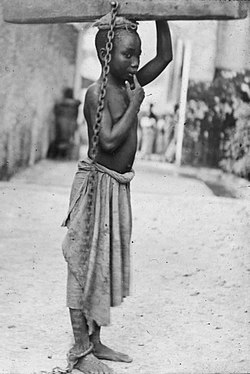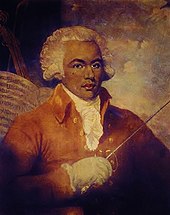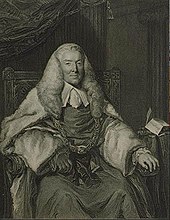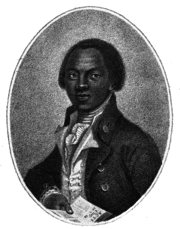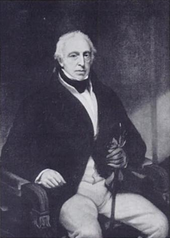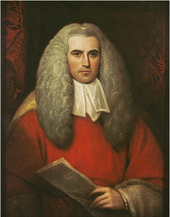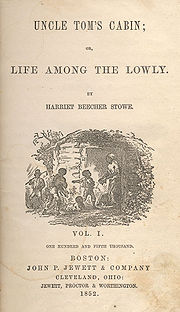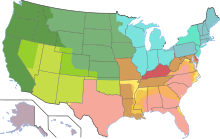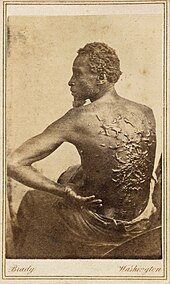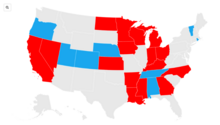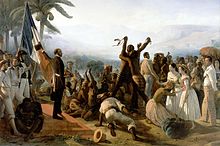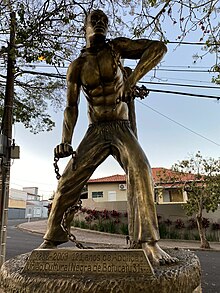Abolitionism
The United States would pass the 13th Amendment in December 1865 after having just fought a bloody Civil War, ending slavery "except as a punishment for crime".
Balthild of Chelles, herself a former slave, queen consort of Neustria and Burgundy by marriage to Clovis II, became regent in 657 since the king, her son Chlothar III, was only five years old.
[9][10] During the Age of Enlightenment, many philosophers wrote pamphlets against slavery and its moral and economical justifications, including Montesquieu in The Spirit of the Laws (1748) and Denis Diderot in the Encyclopédie.
The slave revolt, in the largest Caribbean French colony of Saint-Domingue in 1791, was the beginning of what became the Haitian Revolution led by formerly enslaved people like Georges Biassou, Toussaint L'Ouverture, and Jean-Jacques Dessalines.
[12] In 1793, French Civil Commissioners in St. Domingue and abolitionists, Léger-Félicité Sonthonax and Étienne Polverel, issued the first emancipation proclamation of the modern world (Decree of 16 Pluviôse An II).
[13] The connection with France lasted until blacks and free people of colour formed L'armée indigène in 1802 to resist Napoleon's Expédition de Saint-Domingue.
[15] Abbé Grégoire and the Society of the Friends of the Blacks were part of the abolitionist movement, which had laid important groundwork in building anti-slavery sentiment in the metropole.
Fearing secession from these islands, successfully lobbied by planters and concerned about revenues from the West Indies, and influenced by the slaveholder family of his wife, Napoleon Bonaparte decided to re-establish slavery after becoming First Consul.
The news of the Law of 4 February 1794 that abolished slavery in France and its colonies and the revolution led by Colonel Delgrès sparked another wave of rebellion in Saint-Domingue.
[18] Though anti-slavery sentiments were widespread by the late 18th century, many colonies and emerging nations continued to use slave labour: Dutch, French, British, Spanish, and Portuguese territories in the West Indies, South America, and the Southern United States.
[20] Haiti (then Saint-Domingue) formally declared independence from France in 1804 and became the first nation in the Western Hemisphere to permanently eliminate slavery in the modern era, following the 1804 Haitian revolution.
[33] After reading about Somersett's Case, Joseph Knight, an enslaved African who had been purchased by his master John Wedderburn in Jamaica and brought to Scotland, left him.
[29] But at the same time, legally mandated, hereditary slavery of Scots persons in Scotland had existed from 1606[35] and continued until 1799, when colliers and salters were emancipated by an act of the Parliament of Great Britain (39 Geo.
[52] Bartolomé de las Casas was a 16th-century Spanish Dominican priest, the first resident Bishop of Chiapas (Central America, today Mexico).
[59][60] Two chief justices, Thomas Andrew Lumisden Strange (1790–1796) and Sampson Salter Blowers (1797–1832) were instrumental in freeing slaves from their owners in Nova Scotia.
[65] In his book The Struggle For Equality, historian James M. McPherson defines an abolitionist "as one who before the Civil War had agitated for the immediate, unconditional, and total abolition of slavery in the United States".
[66] Benjamin Franklin, a slaveholder for much of his life, became a leading member of the Pennsylvania Society for the Abolition of Slavery, the first recognized organization for abolitionists in the United States.
If the slave is not allowed to read his bible, the sin rests upon the abolitionists; for they stand prepared to furnish him with a key to it, which would make it, not a book of hope, and love, and peace, but of despair, hatred and blood; which would convert the reader, not into a Christian, but a demon.
The white abolitionist movement in the North was led by social reformers, especially William Lloyd Garrison (founder of the American Anti-Slavery Society) and writers Wendell Phillips, John Greenleaf Whittier, and Harriet Beecher Stowe.
With the 1860 presidential victory of Abraham Lincoln, seven Deep South states whose economy was based on cotton and the labour of enslaved people decided to secede and form a new nation.
Authors such as Harriet Beecher Stowe (United States) and Gertrudis Gómez de Avellaneda (Brazil) used their novels to call into question the humanity of slavery.
Women such as the Grimké Sisters, Abigail Adams, Elizabeth Cady Stanton and others used their connections to political movements to advocate for the abolition of slavery.
Enslaved women such as Phillis Wheatley and Harriet Tubman took matters into their own hands by challenging the institution of slavery through their writing and their actions.
[90] Enslaved women like Adelina Charuteira used their mobility as street vendors and as much access as they had to literacy to spread information about abolition between freedom-seeking people and local abolitionist networks.
[106] In societies with large proportions of the population working in conditions of slavery or serfdom, stroke-of-the-pen laws declaring abolition can have thorough-going social, economic and political consequences.
[112] The Faculty of Law at the University of Ottawa held a major international conference entitled, "Routes to Freedom: Reflections on the Bicentenary of the Abolition of the Slave Trade", from 14 to 16 March 2008.
[114] The Reconstruction Amendments in their aim to promote citizenship and emancipation are believed by these thinkers to still be guiding principles in the fight for freedom and abolition.
There are suggestions that a broad reading of the Thirteenth Amendment can convey an abolitionist vision of the freedom advocated for by black people in the public sphere beyond emancipation.
[116] Just like abolitionism more generally, abolitionist constitutionalism seeks to provide a vision which will lead to the abolition of many different neoliberal state institutions, such as the prison industrial complex, the wage system, and policing.
Since 1997, the United States Department of Justice has, through work with the Coalition of Immokalee Workers, prosecuted six individuals in Florida on charges of slavery in the agricultural industry.
